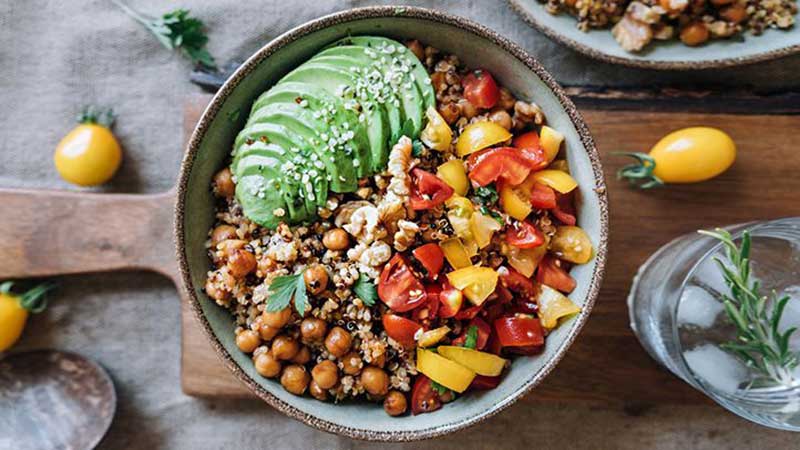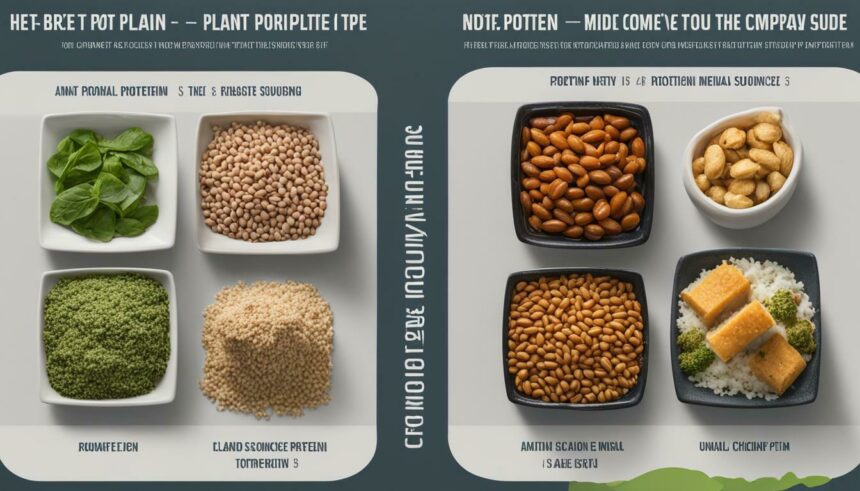Protein is an essential macronutrient that plays a crucial role in building and repairing tissues, supporting immune function, and maintaining healthy bones, muscles, and organs. While both plant and animal-based sources can provide sufficient protein intake, the nutritional composition of each varies considerably. In this article, we’ll examine the differences between plant protein and animal protein, exploring their sources, composition, and nutritional profiles to help you make informed decisions about which type of protein is right for your diet.
Key Takeaways
- Understanding the differences between plant protein vs animal protein is essential when making dietary choices.
- Plant protein sources are abundant but often less concentrated in amino acids compared to animal protein sources.
- Animal protein sources provide a complete set of amino acids and are often more concentrated in nutrients like iron, zinc, and vitamin B12.
- While plant-based diets have been shown to provide numerous health benefits, it can be challenging to meet certain nutrient requirements without proper planning and supplementation.
- Incorporating a variety of plant and animal protein sources can provide a balanced and well-rounded diet that meets all nutritional needs.
What is Plant Protein?
Plant protein refers to the type of protein found in a variety of plant-based foods. As society becomes more focused on health and sustainability, a plant-based diet has become increasingly popular. Fortunately, there are many vegan protein sources to choose from, so going plant-based doesn’t mean sacrificing much-needed nutrients.
Some high protein vegetarian foods include legumes (such as lentils and chickpeas), nuts, seeds, and grains. These provide a good balance of amino acids and nutrients needed to maintain optimal health.
Plant Protein Benefits
In addition to being a great way to get the nutrients that your body needs, plant protein offers a number of additional benefits. One of the primary benefits of plant protein is that it is often easier to digest than animal protein. This makes it ideal for individuals who have digestive issues or food sensitivities. Additionally, plant-based protein is often lower in saturated fat and calories than its animal-based counterpart, making it a great option for maintaining a healthy weight.
Another benefit of โปรตีนคุมหิว อิ่มนาน is that it is often more sustainable than animal protein. This is because it takes less energy and resources to produce plant-based protein than it does to produce animal protein. This makes it a great option for individuals who are concerned about the environmental impact of their food choices.
What is Animal Protein?
Animal protein refers to the protein obtained from animal sources such as meat, dairy, eggs, and fish. These sources provide all the essential amino acids needed by the body, making animal protein a complete protein source.
| Animal Protein Sources |
|---|
| Beef |
| Pork |
| Chicken |
| Fish |
| Eggs |
| Milk |
| Cheese |
Animal protein is an excellent source of nutrients such as vitamin B12, iron, and zinc. Consuming these nutrients in the recommended amounts can promote optimal immune function, energy production, and red blood cell formation.
Research also suggests that animal protein may be more beneficial than plant protein for muscle growth and maintenance. This is because animal protein sources such as meat and dairy contain high levels of essential amino acids, particularly leucine, which is a key driver of muscle protein synthesis.
“Consuming these nutrients in the recommended amounts can promote optimal immune function, energy production, and red blood cell formation.”
Another benefit of animal protein is its satiating effect. Studies have shown that protein, in general, can help to reduce appetite and increase feelings of fullness when compared to other macronutrients such as carbohydrates and fat. This can be particularly helpful for individuals looking to manage their weight or improve their body composition.
Despite these benefits, it is important to consume animal protein in moderation and choose lean, unprocessed sources whenever possible to avoid excessive intake of saturated fat and cholesterol which can have negative impacts on cardiovascular health.
Composition and Nutritional Profiles
Now that we’ve covered the sources and benefits of plant and animal protein, let’s compare their composition and nutritional profiles.
Amino Acid Profiles: One of the key differences between plant and animal protein is their amino acid profiles. While both contain essential amino acids that our bodies cannot produce, animal protein tends to have a more complete amino acid profile. This means that animal protein sources typically contain all nine essential amino acids in sufficient amounts, while plant protein sources may lack one or more of these amino acids.
| Animal Protein | Plant Protein | |
|---|---|---|
| Complete Amino Acid Profile | Yes | No (with some exceptions) |
| Bioavailability: | High | Varies by source |
| Protein Content per serving: | Varies (8 to 30 grams) | Varies (3 to 15 grams) |
Bioavailability: Another important factor to consider is bioavailability, which refers to our body’s ability to absorb and utilize the protein. Animal protein sources are generally more bioavailable than plant protein sources, as they contain more of the essential amino acids in a form that our bodies can easily digest and absorb. Some plant protein sources, such as soy and quinoa, are exceptions and have similar bioavailability to animal protein sources.
Nutrient Content: While both plant and animal protein sources offer important nutrients, the specific nutrient content can vary. Animal protein sources tend to be high in vitamin B12, vitamin D, and calcium, while plant protein sources are often good sources of fiber, vitamin C, and phytonutrients. It’s important to consider the total nutritional content of the foods you are consuming when deciding on your protein sources.
Ultimately, the choice between plant protein and animal protein depends on individual preferences, dietary restrictions, and nutritional needs. Some people prefer a plant-based diet for ethical or environmental reasons, while others may prefer animal protein sources for their taste or convenience. It’s important to choose a variety of protein sources and ensure overall nutritional balance in your diet.

Health Benefits of Plant Protein
Plant protein has been gaining popularity in recent years due to its numerous health benefits.
One major benefit of plant protein is its potential to reduce the risk of heart disease. Studies have shown that replacing animal protein with plant protein can lower LDL cholesterol levels, decrease blood pressure, and improve overall heart health.
Additionally, plant protein has been linked to improved weight management. Many plant-based protein sources, such as legumes, nuts, and seeds, are high in fiber, which can help promote feelings of fullness and reduce overeating.
Plant protein has also been shown to support muscle recovery and growth. Although plant proteins may not have a complete amino acid profile, combining different plant protein sources can help meet the body’s protein needs. This can be especially beneficial for those following a vegetarian or vegan diet.
Finally, plant protein sources are often packed with essential vitamins and minerals. For example, soybeans, a common plant protein source, are rich in iron, calcium, and vitamin D. Other plant-based protein sources, such as lentils and quinoa, are also high in many essential nutrients.
Overall, incorporating plant protein into your diet can have numerous health benefits. By including a variety of plant-based protein sources in your meals, you can reap the benefits of improved heart health, weight management, muscle growth, and nutrient intake.
Health Benefits of Animal Protein
Animal protein offers several notable health benefits that make it a valuable addition to any diet. Here are some of the key advantages:
Muscle Growth
Animal protein is an excellent source of the amino acids needed for muscle growth, making it a popular choice for athletes and bodybuilders. Additionally, animal protein tends to be more easily absorbed by the body, allowing for more efficient muscle recovery and repair.
Satiety
Animal protein is more satiating than plant protein, meaning it helps you feel full and satisfied for longer periods of time. This can be especially beneficial for those looking to manage their weight or curb their appetite.
Nutrient Absorption
Animal protein is also a good source of essential vitamins and minerals, such as iron, zinc, and vitamin B12. These nutrients are important for maintaining overall health and wellbeing, and are often easier for the body to absorb from animal sources.
It’s important to note that not all animal protein sources are created equal. Consuming too much processed or red meat has been linked to an increased risk of certain health conditions, such as heart disease and cancer. Choosing leaner cuts of meat, such as chicken or fish, and incorporating plant-based protein sources into your diet can help you reap the benefits of animal protein without overdoing it.
Plant Protein Supplements
Plant protein supplements are a convenient and effective way to increase your protein intake, particularly if you follow a plant-based diet or have specific dietary restrictions. These supplements are typically made from sources such as pea, rice, or soy protein and come in various forms, including powders, bars, and shakes.
One of the key benefits of plant protein supplements is their versatility. They can be easily integrated into a range of recipes and meals, from smoothies and oatmeal to protein-packed snacks and baked goods.
It’s important to note that not all plant protein supplements are created equal. Some may contain added sugar or artificial flavors, so it’s important to read the ingredient list carefully. Additionally, some may not provide a complete amino acid profile, which means you may need to combine them with other protein sources throughout the day to meet your needs.
If you’re considering adding a plant protein supplement to your diet, it’s important to choose a high-quality product that meets your nutritional needs and tastes good. Look for products that are certified organic and non-GMO, and consider consulting with a registered dietitian to determine the best option for you.
Conclusion
Both plant protein and animal protein have their unique benefits, and the choice between the two ultimately depends on personal preferences, dietary restrictions, and overall nutritional balance.
For those following a vegetarian or vegan diet, plant protein is a fantastic option, as it offers a range of essential nutrients and has been linked to various health benefits. Plant protein is also an excellent choice for those looking to reduce their intake of saturated fat and cholesterol.
On the other hand, animal protein is an excellent source of essential amino acids, iron, and vitamin B12. It has been linked to muscle growth, satiety, and nutrient absorption. Additionally, animal protein is an excellent option for those looking to increase their calorie intake and build muscle mass.
When comparing plant protein vs animal protein, it’s essential to consider the composition and nutritional profiles. Plant protein tends to be lower in some amino acids and has lower bioavailability compared to animal protein. However, plant protein is typically higher in fiber, antioxidants, and other beneficial compounds.
Regardless of your dietary preferences, it’s crucial to prioritize balanced nutrition and ensure you’re meeting your daily protein requirements. This can be achieved by incorporating a variety of protein sources into your diet, such as legumes, nuts, seeds, fish, poultry, and lean meats.
In conclusion, determining whether to consume plant protein vs animal protein depends on various factors. By understanding the nutritional profiles and health benefits of each, you can make an informed decision that aligns with your dietary preferences and goals.
FAQ
What are the differences between plant protein and animal protein?
Plant protein is derived from plant sources such as legumes, nuts, and seeds, while animal protein comes from animal sources like meat, dairy, and eggs. The key differences lie in their amino acid profiles, bioavailability, and nutrient content.
What is plant protein and why is it beneficial?
Plant protein refers to protein derived from plant-based sources. Following a plant-based diet has various benefits, including reduced risk of chronic diseases, increased intake of fiber and antioxidants, and improved environmental sustainability.
What is animal protein and what are its health benefits?
Animal protein comes from animal sources and provides essential amino acids necessary for muscle growth and repair. It also contains important nutrients like vitamins B12 and iron. Consuming animal protein in moderation can contribute to a balanced diet.
How does the composition of plant protein and animal protein differ?
Plant protein generally has lower levels of certain amino acids compared to animal protein. However, combining different plant protein sources can help achieve a balanced amino acid profile. Animal protein, on the other hand, tends to have a more complete amino acid profile.
What are the health benefits of consuming plant protein?
Incorporating plant protein into your diet can promote heart health, aid in weight management, and reduce the risk of chronic diseases such as diabetes and certain types of cancer. Plant protein is also often lower in saturated fat and cholesterol.
What are the health benefits of consuming animal protein?
Animal protein is rich in essential amino acids necessary for muscle growth and repair. It also provides important nutrients like iron, vitamin B12, and omega-3 fatty acids. Including animal protein in your diet can contribute to overall nutrient intake.
Are there plant protein supplements available?
Yes, there are various plant protein supplements available in the market. These supplements often use protein sources like pea, hemp, soy, or brown rice. Plant protein supplements can be a convenient way to increase protein intake, especially for those following a plant-based or vegetarian diet.
How do I choose between plant protein and animal protein?
The choice between plant protein and animal protein depends on personal preferences, dietary restrictions, and overall nutritional goals. It’s important to consider factors like taste, texture, environmental impact, and individual health needs when making a decision.











